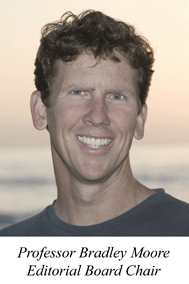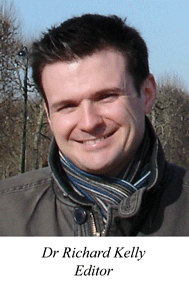Happy New Year from Natural Product Reports
In our first Editorial as NPR Editorial Board Chair and Editor we would like to wish all our readers a happy New Year.2010 was another very successful year for NPR. Not only did the journal publish more high-quality content than ever, the 2009 ISI® impact factor of 9.202, released in summer 2010, is the highest yet for the journal. We would like to thank our authors, readers, referees and Editorial Board members for helping us to make 2010 another great year for NPR and we look forward to working with you all in 2011.
Viewpoint articles
2010 saw the introduction of Viewpoints, a new article type for NPR. Viewpoints are short, opinion-style articles which focus on key challenges in natural products research. The first article, by Professor Sam Danishefsky focussed on the potential of natural products in the discovery of pharmaceutical leads (DOI: 10.1039/c003211p), and in this issue we have a Viewpoint by Dr Roy Erkens explaining plant naming and the important role that it plays in natural products chemistry (DOI: 10.1039/c0np00042f). Look out for more Viewpoint articles throughout the year.Themed issues
Two more successful NPR themed issues were published in 2010. In May our ‘Metals in Cells’ issue was published, featuring articles on topics ranging from the chemistry and biology of siderophores to molecular recognition in copper trafficking. The second ‘Synthesis’ issue, following on from the first issue on this topic in 2008, was published in August. As well as featuring our first Viewpoint article, this issue covered organocatalysis and the synthesis of marine natural products, amongst other topics. More themed issues of NPR are planned for 2011 and beyond, starting with a ‘Marine Natural Products’ themed issue early in the year.Board changes
The end of 2010 saw the retirement of Professor Marcel Jaspars as Chair of the NPR Editorial Board. Marcel had been a member of the Board since 2003 and the Chair since 2007. During this time Marcel oversaw significant growth in the journal, both in terms of the number of high-quality articles published and in the range of topics covered. We would like to thank Marcel for his leadership over the past four years. Marcel now joins the Advisory Editorial Board, and we look forward to continuing to work with him in that role.2010 also saw the retirement of three other Editorial Board members. Professor Emma Raven joined the NPR Board in 2005 and since then has expanded the bioinorganic natural products content of the journal, including two very successful themed issues in this area. Dr Kira Weissman also joined the Board in 2005 and in her time on the board made a significant contribution to the biosynthetic content of the journal; we wish her all the best in her new academic position at the Université Henri Poincare in Nancy, France. The final retirement is Professor Peter Houghton, who in his three years on the Board commissioned a number of articles in the key area of ethnopharmacology. We would like to thank all of our retiring Board members for their contributions to the journal.
In 2011 we welcome several new members to the Editorial Board: Professor Sarah O'Connor, Professor Shiou-Chuan (Sheryl) Tsai, Professor Simon Gibbons and Dr Guy Carter.
NPR Lecture Award
Congratulations to Professor Chris Walsh, who was the recipient of the 2010 NPR Lecture Award. Professor Walsh, who has authored a number of articles for NPR in recent years, delivered his lecture during the “Biosynthesis of Natural Products” symposium at Pacifichem 2010 in Hawaii in December. Nominations for the 2010 NPR Lecture Award are now closed and the results will be announced early this year.We hope that you enjoy reading this first issue of 2011.
RSC Publishing news
Quality and growth continues
It's quality that really matters at RSC Publishing, and the 2009 Journal Citation Reports® proved that our quality is better than ever, as our average impact factor (IF) rose from 4.9 to 5.4. It's an impressive figure, especially when compared with the average for a chemistry journal of 2.4.But we don't rely on just one or two titles to boost our average. It's our entire collection that counts: of the top 20 journals in the multidisciplinary chemistry category, 25% are from RSC Publishing; and 90% of our titles have an IF over 3.
Our list of titles continues to grow: Food & Function and Catalysis Science & Technology are the latest titles to join our expanding portfolio. Plus, the number of articles we've published has increased by 74% in the last 2 years alone. We remain committed to providing a world-class publishing service to our authors, and delivering cutting-edge chemical science to readers throughout the world.
The IF and article growth figures provide a clear indication that more researchers than ever before are recognising journals from the RSC as a key resource to access the very best research.
2011 Books
With steady front-list growth and cutting-edge content, delivering excellence and authority, the RSC is one of the world's leading chemical science print and online book publishers.Comprising nearly 1000 eBooks equating to one-third of a million pages, the RSC eBook Collection delivers outstanding online research and opinion in a multitude of areas of the chemical sciences. Nine new RSC eBook Subject Collections offer additional flexibility.
With over 90 new print titles planned for 2011, including second editions of seminal texts, and the launch of the RSC Polymer Chemistry and RSC Metallobiology series, our contribution to chemistry collections worldwide is diverse, topical and high-impact. Expect another first-class collection of best-selling chemical science titles in 2011.
New RSC Publishing Platform
Access one million journal articles and book chapters in one simple integrated search.The new RSC Publishing Platform has been developed in consultation with the international scientific and librarian community. Together we have identified the best and most-valued interface and features that connect you with the highest quality scientific research. With one single search box, easily access our books, journals and databases for students, academics, researchers, scientists and professionals.
Free online access
Free online access is available to all our newest journals and more – all you need to do is register for an RSC Publishing personal account. Then, when you are logged in, you will be able to access all our free content. Currently this includes:• All content of our newest journals for the first 2 volumes
• Any articles that are part of a special free access promotion (e.g. ‘hot’ papers, web themed issues, etc.)
• All journal content published more than two years ago (dating back to 1997)
• A sample chapter from each book in the RSC eBook Collection
With your username and password you can access the free content any time, any place – all you need is internet access. Register at www.rsc.org/personalregistration.
If your institution is a current customer with its IP registered, you will be able to access all free content. Other institutions can apply for free online access to our newest journals using our online form: www.rsc.org/freeaccess.
ChemSpider
Have you heard about the RSC's award-winning chemical structure and text-based search engine – ChemSpider? It's FREE!ChemSpider provides access to:
• Millions of chemical structures
• An abundance of additional property information
• Tools to upload, curate and use the data
• A multitude of other online services like the RSC Publishing Platform
ChemSpider is one of the richest single sources of structure-based chemistry information.
Visit www.chemspider.com (for mobile devices: cs.m.chemspider.com)
RSC 2011 conferences and events
As a learned society, we host more than 300 international conferences and events, and the following have been highlighted as areas you may find of interest. Visit www.rsc.org/ConferencesAndEvents to view the complete schedule of events for 2011.Antibiotics: Where now? II – London, UK, 20 January
22nd International Symposium: Synthesis in Organic Chemistry – Cambridge, UK, 11–14 July
Challenges in Chemical Biology (ISACS5) – Manchester, UK, 26–29 July
International Year of Chemistry 2011
IUPAC (in conjunction with the UN and UNESCO) have proclaimed 2011 as the International Year of Chemistry (IYC), the goals of which are: to increase the public appreciation of chemistry in meeting world needs; to encourage interest in chemistry among young people; and to generate enthusiasm for the creative future of chemistry.The RSC will be leading the way in IYC 2011, supporting this important initiative through a series of events and activities.
| This journal is © The Royal Society of Chemistry 2011 |


